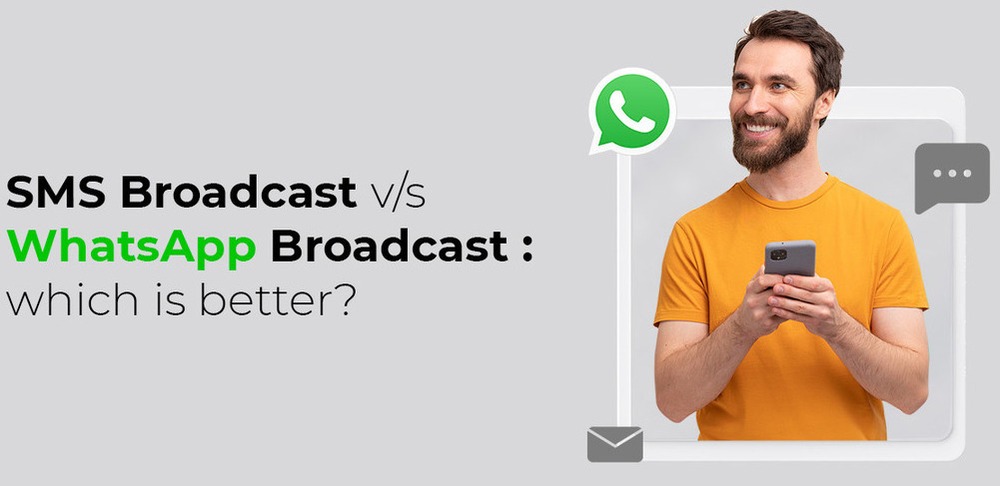
In today’s fast-paced business environment, bulk messaging has become an essential tool for communication. Companies need to send instant notifications to a large audience, making it crucial to choose the right messaging platform. While SMS has long been a reliable bulk messaging solution, WhatsApp has gained significant popularity in recent years. For businesses unsure about which platform to use, this article provides a comprehensive comparison to help make an informed decision.
Understanding SMS Broadcast
What is SMS Broadcasting? SMS broadcasting refers to the process of sending mass text messages to multiple recipients simultaneously. Businesses commonly use SMS broadcasts to share important updates, promotions, and alerts with their customers. Due to its ease of setup and high open rates, SMS has remained a widely used bulk messaging method.
Advantages of SMS Broadcasting
- Personalized Communication
Each message is sent as an individual text, ensuring a personal touch without revealing that it is part of a bulk broadcast. - Device & Connectivity Independence
SMS messages can be received on any mobile device, including basic phones, without requiring an internet connection. - High Open Rates
SMS messages have an impressive open rate of around 80-90%, ensuring that most recipients see the message. - Quick & Simple Setup
Many platforms offer user-friendly tools to create and send SMS campaigns within minutes. - Cost-Effective Solution
SMS broadcasting is an affordable marketing tool, with various budget-friendly third-party applications available for businesses.
Limitations of SMS Broadcasting
- Text-Only Format
SMS messages are limited to plain text and do not support rich media such as images or videos. - Reliance on Third-Party Services
Businesses must use third-party SMS providers, which can add operational complexities. - Character Limitations
Messages are typically restricted to 160 characters, limiting the ability to convey detailed information. - Limited Tracking & Analytics
SMS lacks advanced analytical features, such as tracking whether a recipient has read the message. - Spam Filters
Some SMS applications automatically filter messages that appear promotional, potentially reducing reach.
Understanding WhatsApp Broadcast
What is WhatsApp Broadcasting? WhatsApp allows businesses to send messages to multiple contacts simultaneously. Users of WhatsApp Business can create broadcast lists with up to 256 contacts, while API users can expand this to 1,000 contacts per list. With WhatsApp’s growing user base, it has become a powerful marketing and communication tool for businesses.
Advantages of WhatsApp Broadcasting
- Wider Audience Reach
With over 2 billion users worldwide, WhatsApp ensures businesses can connect with a diverse audience. - Rich Media Support
Businesses can send engaging messages with images, videos, GIFs, and other media formats. - Reusable Broadcast Lists
Contact lists can be saved and used multiple times, making communication more efficient. - Two-Way Communication
Unlike SMS, WhatsApp enables real-time conversations, allowing customers to respond and engage with businesses instantly. - End-to-End Encryption & Privacy
Messages are secured with encryption, ensuring privacy and data protection.
Limitations of WhatsApp Broadcasting
- Strict Business Policies
WhatsApp enforces strict guidelines, and businesses that fail to comply risk being restricted or banned. - Contact Storage Requirement
Only saved contacts can be added to a broadcast list, requiring businesses to maintain an updated customer contact database. - Customer Opt-In Requirement
Users must provide consent before businesses can send them promotional messages. - Device & Connectivity Dependency
WhatsApp requires an internet connection and is not supported on all mobile devices, which may limit reach in some regions. - Limited Analytics
While WhatsApp provides some tracking capabilities, it lacks in-depth analytics such as clickthrough rates and engagement metrics.
Key Differences Between SMS Broadcast and WhatsApp Broadcast
| Feature | SMS Broadcast | WhatsApp Broadcast |
|---|---|---|
| Message Type | Text Only | Text, Images, Videos, GIFs |
| Connectivity | Works without internet | Requires internet |
| Contact Requirement | No prior consent needed | Users must opt-in |
| Two-Way Interaction | No | Yes |
| Security & Encryption | Low | High |
| Analytics | Basic delivery reports | Limited tracking features |
| Open Rates | 80-90% | Very High |
| Spam Filtering | Possible | Minimal |
How to Create a WhatsApp Broadcast List
If you decide to use WhatsApp for bulk messaging, here’s how you can create a broadcast list on WhatsApp Business:
- Open WhatsApp Business and tap on More Options.
- Select New Broadcast.
- Choose the contacts you want to add to the list.
- Tap the Tick mark to create the broadcast list.
- Edit the list by tapping Broadcast List Info under More Options.
- Modify the name, add or remove contacts, or delete the list as needed.
Using WhatsApp API for Larger Broadcasts For businesses looking to send messages to a larger audience, WhatsApp API enables bulk messaging to up to 100,000 users per day, depending on business verification and engagement levels.
FAQs
1. Is there a limit to the number of contacts in a WhatsApp broadcast list?
Yes, WhatsApp Business allows only 256 contacts per list. However, WhatsApp API users can expand this limit, with the potential to reach up to 100,000 users per day through tiered access levels.
2. What is the difference between a WhatsApp group and a WhatsApp broadcast?
A WhatsApp broadcast sends messages directly to each recipient’s private chat, enabling one-on-one interactions. In contrast, WhatsApp groups function as public forums where all members can see and respond to messages.
3. Why is WhatsApp Broadcast a preferred choice for marketing?
WhatsApp broadcasts support multimedia content, enable two-way communication, and ensure high open rates. Additionally, the platform offers encrypted messaging for enhanced privacy and security.
Conclusion: Which One Should You Choose?
Both SMS and WhatsApp broadcasting offer unique benefits. SMS is a reliable option for reaching users without internet access and is cost-effective. However, WhatsApp provides a more interactive and visually appealing experience with better engagement potential.
For businesses looking for high customer interaction and rich media support, WhatsApp is the preferred option. However, SMS remains a strong contender for simple, instant, and widespread communication.
Consider your audience, business goals, and communication needs before choosing the best platform for your bulk messaging campaigns.

